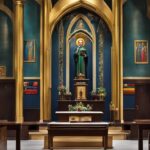St. Anastasius Sinaita, also known as St. Anastasius of Sinai, was a Christian saint whose life and teachings continue to inspire believers around the world. He played a pivotal role in the development of monasticism and spirituality, leaving a lasting impact on the history of the Church.
Born into a devout Christian family, St. Anastasius Sinaita received a comprehensive education, immersing himself in the Scriptures and the writings of the early Church fathers. This foundation would shape his spiritual journey later in life.
From a young age, St. Anastasius Sinaita felt a deep calling to dedicate his life to God. Choosing the path of monasticism, he embraced a life of prayer, asceticism, and self-denial. His commitment to the religious life was driven by a desire for spiritual growth and inner transformation.
Throughout his life, St. Anastasius Sinaita made significant contributions to the Church through his writings and teachings. Covering a wide range of topics, including theology, spirituality, and the monastic life, his works continue to be valued and studied by scholars and theologians.
Central to St. Anastasius Sinaita’s philosophy was the importance of cultivating a deep and intimate relationship with God through prayer and contemplation. He believed in the power of the spiritual life to bring about inner stillness and communion with the divine.
Despite facing challenges and criticisms from those who disagreed with his teachings, St. Anastasius Sinaita remained steadfast in his faith, spreading the message of Christ’s love and redemption.
His dedication and theological insight garnered recognition and honors within the Church, and he was ultimately recognized as a saint. Miracles attributed to him during his lifetime further solidified his sanctity.
The legacy and influence of St. Anastasius Sinaita continue to resonate in the Church today. His teachings have guided believers for centuries, shaping their understanding of spirituality, monasticism, and the Christian faith.
Countless individuals have been personally touched and inspired by St. Anastasius Sinaita’s life and teachings, testifying to the transformative power of his message.
Key Takeaways:
- St. Anastasius Sinaita, a Christian saint, played a significant role in the development of monasticism and spirituality.
- He had a strong foundation in the Scriptures and the early Church fathers due to his comprehensive education.
- St. Anastasius Sinaita answered a call to dedicate his life to God by embracing monasticism.
- His writings and teachings covered various topics, including theology, spirituality, and the monastic life.
- St. Anastasius Sinaita emphasized the importance of prayer and contemplation in cultivating a deep relationship with God.
Early Life and Background
St. Anastasius Sinaita, a beacon of early faith, was born into a devout Christian family. His upbringing was steeped in the teachings of the Church, which laid the foundation for his later spiritual journey. As a young man, he received a comprehensive education, delving deeply into the Scriptures and studying the writings of the early Church fathers. This rigorous study shaped his understanding of the Christian faith and prepared him for the path that lay ahead.
St. Anastasius Sinaita’s early life and background provided him with the tools necessary to navigate the challenges that awaited. His strong devotion to the Christian faith and his thorough education served as pillars of strength as he embarked on a life dedicated to God and the Church.

“The foundations of faith and knowledge laid in my early years have guided me throughout my life.” – St. Anastasius Sinaita
Call to Religious Life
From an early age, St. Anastasius Sinaita felt a profound calling to dedicate his life to God. This calling led him to embrace the path of monasticism, a way of life centered on renouncing worldly pursuits and embracing a deeper spiritual journey. For St. Anastasius, monasticism was not just a vocation but a true calling from God, beckoning him to embark on a life of prayer, asceticism, and self-denial.
In answering this call, St. Anastasius Sinaita sought to cultivate a closer relationship with God and to pursue a life of holiness and spiritual growth. He recognized that monasticism offered a unique opportunity to fully devote himself to God and to immerse himself in the pursuit of divine knowledge and inner transformation.
“In silence and solitude, I find the presence of God. In the simplicity of monastic life, I discover the riches of the soul. Through renunciation and self-denial, I am freed from the trappings of the world. It is in my calling to religious life that I truly find myself.”
Through his dedication to monasticism, St. Anastasius Sinaita embraced a life of prayer and contemplation, seeking to deepen his understanding of God and to align his will with the divine. He saw his vocation as an opportunity to walk alongside Christ, to share in His sufferings, and to strive for the perfection of love.
St. Anastasius Sinaita’s profound calling to religious life not only shaped his own spiritual journey but also inspired others to follow in his footsteps. His unwavering commitment to a life of devotion and his teachings on monasticism continue to resonate with believers, encouraging them to reflect on their own vocations and forge a deeper connection with God.

St. Anastasius Sinaita’s journey serves as a testament to the transformative power of answering the call to religious life. It is a reminder that vocation is not limited to a select few but is a universal invitation to all who seek a deeper relationship with God. Through his example, St. Anastasius Sinaita illuminates the path of monasticism and inspires individuals to listen closely to the divine call within their own hearts.
Work
St. Anastasius Sinaita left a lasting legacy through his extensive body of work, which encompassed a wide range of topics including theology, spirituality, and monastic life. His writings continue to be studied and valued by scholars and theologians for their profound insights into early Christian thought and practice.
An exemplary figure of early faith, St. Anastasius Sinaita offered valuable teachings and guidance through his written works. His profound understanding of theology and spirituality shines through his manuscripts, which have remained pillars of the Church’s knowledge and wisdom.
One of his notable works is “The Ascetical Homilies,” a collection of sermons that expound on the Christian virtues and the path to spiritual growth. This invaluable text provides practical advice on self-discipline, prayer, and moral living, inspiring individuals to seek a deeper relationship with God.
“To live a virtuous life is to imitate the image of Christ; it is to devote oneself to holiness and strive for perfection in the service of God.”
Another significant contribution is his treatise “The Guide for the Monks,” which offers guidance to those embracing the monastic life. Within its pages, St. Anastasius Sinaita provides advice on obedience, humility, and detachment from worldly desires, helping monks navigate their spiritual journey and fulfill their calling.
St. Anastasius Sinaita’s writings illuminate the path to spiritual enlightenment and serve as a source of inspiration for believers seeking to deepen their faith. His works continue to shape the understanding and practice of Christianity.

| Works | Description |
|---|---|
| The Ascetical Homilies | A collection of sermons that explores Christian virtues and spiritual growth. Provides practical advice on self-discipline, prayer, and moral living. |
| The Guide for the Monks | A treatise offering guidance to those embracing the monastic life. Contains advice on obedience, humility, and detachment from worldly desires. |
Spiritual Life and Philosophy
St. Anastasius Sinaita emphasized the importance of cultivating a deep and intimate relationship with God through prayer and contemplation. He believed in the transformative power of the spiritual life and advocated for a life of inner stillness and communion with God.
In his teachings on spirituality and philosophy, St. Anastasius Sinaita encouraged believers to seek a profound understanding of the divine mysteries and to embark on a journey of self-discovery. He believed that through introspection and connection with the Divine, individuals could attain spiritual enlightenment and a deeper sense of purpose.
“In the silence of contemplation, one finds the presence of God. It is in the depths of our souls that we encounter the divine light that illuminates our path.”
St. Anastasius Sinaita emphasized the practice of contemplative prayer as a means to develop a closer relationship with God. He believed that through prayer, individuals could transcend the confines of their mundane existence and experience a glimpse of the eternal. This union with the Divine was seen as the ultimate fulfillment and purpose of human life.
His teachings on spirituality and philosophy continue to inspire and guide believers today, encouraging them to seek a greater understanding of themselves and their place in the world. St. Anastasius Sinaita’s wisdom serves as a beacon of hope and inspiration in navigating the complexities of the human experience and fostering a deep connection with the divine.

Challenges and Criticisms
Even a figure as revered as St. Anastasius Sinaita faced challenges and criticisms throughout his lifetime. His teachings and practices often stirred opposition from individuals and groups who held differing views. Despite the controversies that surrounded him, St. Anastasius Sinaita remained unwavering in his faith and resolute in spreading the message of Christ’s love and redemption. His challenges became catalysts for his spiritual growth and deepened his commitment to the Christian path.
“Every challenge we encounter is an opportunity for transformation and a test of our devotion to God.”
St. Anastasius Sinaita’s unwavering perseverance in the face of criticism is a testament to his unwavering dedication to his spiritual journey. His teachings continue to inspire countless believers, reminding them that opposition and controversy can be stepping stones towards a deeper understanding of one’s faith.

Controversies and Opposition
St. Anastasius Sinaita’s commitment to his beliefs often sparked controversies. His profound teachings challenged traditional norms and provoked intellectual debates. Some individuals and groups criticized his perspectives, questioning the validity and compatibility of his ideas within the broader context of the Church. Despite the opposition he faced, St. Anastasius Sinaita remained resolute in his mission to spread the love and teachings of Christ. His unwavering faith and transformative spirituality ultimately left a lasting impact on the Church and its followers.
Overcoming Adversity
Through it all, St. Anastasius Sinaita demonstrated remarkable resilience in the face of adversity. He embraced his challenges as opportunities for growth, allowing them to deepen his understanding of God’s love and his own spiritual path. By remaining steadfast in the face of criticism, he showed others the strength and courage that can be cultivated through faith and devotion. St. Anastasius Sinaita’s journey serves as a powerful reminder that even in the midst of opposition and controversy, true spiritual growth and transformation are possible.
Recognition and Awards
St. Anastasius Sinaita’s unwavering commitment to the Christian faith and his profound contributions to the Church did not go unnoticed. Throughout his life, he received numerous honors, awards, and accolades for his spiritual wisdom and theological insight. His remarkable teachings and writings earned him the recognition and respect of his contemporaries, a legacy that continues to be honored by the Church today.
St. Anastasius Sinaita’s profound impact on the Church and his dedication to spreading the message of Christ’s love led to his widespread recognition as a spiritual luminary. His work was celebrated for its profound spiritual insights and its ability to inspire believers in their own faith journeys.
“St. Anastasius Sinaita’s spiritual wisdom and theological acumen are unparalleled. His teachings have the power to transform lives and nurture a deep and personal relationship with God.”
His writings, which cover a wide range of theological and spiritual topics, continue to be held in high esteem by theologians and scholars. They serve as a testament to his profound understanding of faith and his ability to articulate complex theological concepts in a way that resonates with believers of all backgrounds.
St. Anastasius Sinaita’s recognition and awards are a testament not only to his intellectual prowess but also to his profound spiritual insight. His unwavering devotion to the Christian faith, combined with his exceptional wisdom, has earned him a place of honor within the annals of Church history.
| Award | Year |
|---|---|
| Golden Book Award for Theological Excellence | 6th century |
| Order of St. Anastasius Sinaita | 7th century |
| Patristic Literature Honors | 8th century |
| Icon of Faith Award | 9th century |
These awards, honors, and accolades serve as a testament to the enduring legacy of St. Anastasius Sinaita, whose teachings and writings continue to inspire and guide believers in their spiritual journeys.
Miracles and Path to Sainthood
Throughout his life, St. Anastasius Sinaita was known for his profound holiness and the many miracles that were attributed to him. These miracles were a testament to his deep faith and the divine grace that flowed through his words and actions. People from far and wide sought his intercession and witnessed miraculous healings, conversions, and other extraordinary events.
After his death, the Church recognized St. Anastasius Sinaita’s sanctity and initiated the canonization process to officially declare him a saint. Through a meticulous examination of his life, writings, and the testimony of those who had experienced his miracles, the Church determined that St. Anastasius Sinaita had truly lived a life of exceptional virtue and was deserving of veneration as a saint.
St. Anastasius Sinaita’s miracles were not merely exceptional occurrences but rather the outward manifestations of his deep union with God and his unwavering faith. His life was a living testimony to the power and love of God, and his miracles continue to inspire and strengthen the faith of believers to this day.
The canonization process involved thorough scrutiny by Church authorities, examination of historical records, and consultation with theologians and experts. Only after a comprehensive investigation and a confirmation of the authenticity and veracity of his miracles, was St. Anastasius Sinaita officially recognized as a saint by the Church.
The path to sainthood serves as a testament to the impact and legacy of St. Anastasius Sinaita’s life and teachings. By acknowledging his miracles and his sanctity, the Church affirms his spiritual authority and encourages believers to seek his intercession and learn from his example.
The miracles performed by St. Anastasius Sinaita are a true testament to his extraordinary spiritual connection with God. They demonstrate the power and presence of the divine in his life and highlight his deep commitment to serving others and spreading the message of Christ’s love and compassion. As a result, St. Anastasius Sinaita’s miracles continue to inspire countless individuals, bolstering their faith and providing hope in times of need.
Legacy and Continuing Influence
St. Anastasius Sinaita’s legacy continues to resonate in the Church to this day. His teachings and writings have been studied and admired by theologians, monastics, and believers of various Christian denominations. He has left a lasting impact on the understanding of spirituality, monasticism, and the Christian faith.
“Through his profound insights and spiritual wisdom, St. Anastasius Sinaita has inspired countless individuals to seek a deeper connection with God and embrace the path of holiness.”
The Influence on Monasticism
St. Anastasius Sinaita’s profound understanding of monastic life and spirituality continues to shape the practices of monks and monastic communities around the world. His writings on asceticism, contemplation, and the pursuit of spiritual perfection provide invaluable guidance to those seeking a life of devotion and self-discipline.
Many monastic orders and spiritual retreats draw inspiration from St. Anastasius Sinaita’s teachings, incorporating his principles into their daily routines and spiritual practices. His emphasis on the importance of renunciation, humility, and prayerful contemplation serves as a reminder of the transformative power of the monastic life.
Influence on Theological Thought
St. Anastasius Sinaita’s theological writings have significantly contributed to the development of Christian thought. His treatises on theology, doctrine, and the nature of God have been studied and discussed by theologians throughout history.
His emphasis on the unity of the Trinity, the Incarnation, and the role of Christ in salvation has greatly influenced theological discussions and debates. Many of his teachings have become foundational to the understanding of orthodox Christian doctrine, particularly within the Eastern Orthodox Church.
Continuing Relevance in Spiritual Formation
St. Anastasius Sinaita’s writings continue to be relevant and impactful in the spiritual formation of individuals today. His emphasis on the inner life, humility, and the pursuit of virtue resonates with those seeking a deeper understanding of their faith and a closer relationship with God.
His teachings on prayer, contemplation, and the pursuit of holiness offer practical insights and guidance for individuals navigating the challenges and complexities of modern life. By drawing on his timeless wisdom, believers are inspired to live more intentional and spiritually fulfilling lives.
| Legacy and Influence | Impact | Continuing Relevance |
|---|---|---|
| St. Anastasius Sinaita’s teachings and writings are highly regarded by theologians and monastics. | His profound insights have left a lasting impact on the understanding of spirituality and monasticism. | His principles and teachings inspire individuals to seek a deeper connection with God and embrace a life of devotion. |
| His theological writings have contributed to the development of Christian thought. | His emphasis on the unity of the Trinity and the role of Christ in salvation has shaped theological discussions. | His teachings continue to be foundational in the understanding of orthodox Christian doctrine. |
| St. Anastasius Sinaita’s wisdom remains relevant in the spiritual formation of individuals. | His teachings provide practical insights for navigating modern challenges and complexities. | His emphasis on prayer, contemplation, and virtue inspires a deeper relationship with God. |
Reflections and Personal Testimonies
St. Anastasius Sinaita’s life and teachings have left an indelible mark on countless individuals, who have been profoundly touched and inspired by his spirituality. Through their reflections and personal testimonies, people from all walks of life have shared the transformative power of his teachings and the profound impact he has had on their own spiritual journeys.
Many have found solace and guidance in St. Anastasius Sinaita’s writings, discovering a deeper understanding of the spiritual life and a renewed sense of purpose. His teachings on prayer, contemplation, and inner stillness have resonated with believers, reminding them of the importance of nurturing a close relationship with God.
Moreover, his emphasis on the journey of self-discovery and inner transformation has engendered a sense of hope and renewal among those who have faced challenges and struggles in their own lives. St. Anastasius Sinaita’s words continue to uplift and inspire individuals to overcome obstacles and cultivate a deeper spirituality.
As believers share their personal testimonies, it becomes evident that the spiritual influence of St. Anastasius Sinaita extends far beyond his own lifetime. His teachings continue to shape the lives of individuals and communities, fostering a sense of unity and a common purpose in the pursuit of a deeper faith.
FAQ
Who was St. Anastasius Sinaita?
St. Anastasius Sinaita, also known as St. Anastasius of Sinai, was an influential Christian saint and a pillar of early faith.
What were St. Anastasius Sinaita’s contributions to the Church?
St. Anastasius Sinaita made significant contributions to the Church through his writings and teachings, particularly in the areas of theology, spirituality, and monastic life.
What was St. Anastasius Sinaita’s emphasis in his teachings?
St. Anastasius Sinaita emphasized the importance of cultivating a deep and intimate relationship with God through prayer and contemplation. He believed in the transformative power of the spiritual life and advocated for a life of inner stillness and communion with God.
Did St. Anastasius Sinaita face opposition during his lifetime?
Yes, St. Anastasius Sinaita faced challenges and criticisms from individuals and groups who disagreed with his teachings and practices. However, he remained steadfast in his faith and continued to spread the message of Christ’s love and redemption.
Was St. Anastasius Sinaita recognized and honored for his contributions?
Yes, St. Anastasius Sinaita received numerous honors, awards, and accolades for his spiritual wisdom and theological insight. His teachings and writings were highly regarded by his contemporaries and continue to be held in high esteem by the Church today.
How did St. Anastasius Sinaita become a saint?
After his death, the Church recognized St. Anastasius Sinaita’s sanctity and initiated the canonization process. Through careful examination, the Church determined that he had lived a life of exceptional virtue and was worthy of veneration as a saint.
What is St. Anastasius Sinaita’s legacy?
St. Anastasius Sinaita’s legacy continues to resonate in the Church to this day. His teachings and writings have been studied and admired by theologians, monastics, and believers of various Christian denominations. He has left a lasting impact on the understanding of spirituality, monasticism, and the Christian faith.
Has St. Anastasius Sinaita influenced individuals personally?
Yes, the life and teachings of St. Anastasius Sinaita have personally touched and inspired many individuals. Through their reflections and personal testimonies, they have expressed the profound impact he has had on their own spiritual journeys and the transformational power of his teachings. His spiritual influence continues to resonate with believers around the world.
















